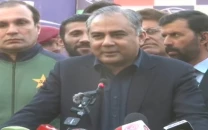International Media Summit: ‘Pakistani journalists work under extreme pressure in difficult circumstances’
Exchange programme participants get further training, advise on how to improve.

Exchange programme participants get further training, advise on how to improve.
Strengthening the community of journalists. This was the core aim of a two-day summit for alumni of the US-Pakistan Professional Partnership in Journalism which concluded here on Saturday.
The summit was organised by the International Centre for Journalists (ICFJ) and saw 88 Pakistani journalists from across the country and seven American journalists get together for back-to-back training sessions and seminars. Four American journalists including ICFJ Vice President Patrick Butler, investigative journalist Hoda Osman, Sherry Ricchiardi, an expert on conflict reporting, and Sean Carlson, an expert on social and digital media, trained Pakistani journalists.
During the seminar, American journalists expressed their concerns over the prevailing security situation in Pakistan and the challenges faced by its journalists. “Pakistani journalists work with little resources but are incredibly passionate about their profession,” said ICFJ Senior Programme Director Johanna Carrillo.
Speaking to The Express Tribune, ICFJ Vice President Patrick Butler was of the view that the Pakistani media today is extremely vigorous and has a lot of freedom to report about the government as well as different important players. “However, due to security concerns, journalists have to be wary of red lines that cannot be crossed.” he said.
During the session on conflict reporting Ricchiardi, mentioned that conflict reporting in Pakistan was complicated when compared to the rest of the world.
Commenting on the Pakistani media, particularly the electronic media, Butler said that there is a need to adopt new ways to disseminate information effectively rather than the stereotypical way in which talk show panelists engage in shouting matches. Butler further said that there were other challenges, such as the sluggishness with which the Pakistani media is adapting trends that are emerging all over the world.
He suggested training journalists on how to use social media and equipping them with resources to help overcome this challenge. However, Butler also said that “despite all this, we have a lot to learn from Pakistani journalists…the courage with which they work under challenging conditions.”
Carrillo said that many positive changes had come about as the outcome of the programme. Some of them involve getting rid of the misconceptions both American and Pakistani journalists had about each other’s countries, while others included engaging Pakistani journalists with the use of social media. “We have heard from participants that they only recently started to use blogs to express their views and run stories that otherwise couldn’t be covered,” she said.
“One challenge that our participants often face is a resistance from their media outlets to make the changes that they propose,” said Carrillo.
They suggested that the Pakistani media improve by giving more importance to fact checking, accuracy and focus more on local news.
Over a span of two years, nearly 80 journalists in six groups of 14 participants each have worked in different newsrooms across the US through the programme. ICFJ US-Pakistan Exchange program has been expanded and will now bring 160 journalists to US newsrooms.
The seventh group is expected to leave by the end of April.
Published in The Express Tribune, February 3rd, 2013.



















COMMENTS
Comments are moderated and generally will be posted if they are on-topic and not abusive.
For more information, please see our Comments FAQ